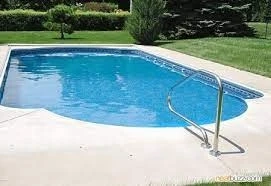When it comes to luxurious and enduring swimming pool options, few choices rival the enduring appeal of gunite pools. These pools are renowned for their customizable designs, durability, and ability to transform any outdoor space into a captivating aquatic oasis. One of the key factors that contribute to the longevity and aesthetic charm of gunite pools is the meticulous balance of hardness levels and we also going to know about How to Balance Hardness Levels in Gunite Pool
Unveiling Gunite Pool
Gunite pools, also known as concrete pools, are constructed using a blend of cement, sand, and water that is pneumatically sprayed onto a framework of steel reinforcement bars. This unique construction method allows for intricate designs, shapes, and sizes that are limited only by imagination. From classic rectangular pools to freeform lagoons, gunite pools have the flexibility to accommodate any design vision.
The Crucial Role of Balance
While the aesthetic and structural benefits of gunite pools are widely celebrated, maintaining optimal hardness levels within the pool surface is paramount for preserving both the pool's beauty and structural integrity. The balance between hardness and flexibility ensures that the pool can withstand the test of time and the stresses of use, while also providing a comfortable and safe swimming environment.
The Science Behind Hardness Levels
The hardness of a gunite pool's surface is determined by the curing process of the concrete. As the concrete cures, the chemical reactions between cement and water lead to the formation of calcium silicate hydrate crystals. These crystals contribute to the strength and hardness of the pool's surface. However, an excessively hard surface can become brittle and prone to cracking, while a surface that's too soft might wear down quickly.
Tips for Pool Owners
Regular Testing: Pool owners should regularly test the hardness levels of their gunite pools using appropriate testing kits. These kits can provide insights into the pool's calcium hardness levels, helping owners understand whether adjustments are needed.
Calcium Hardness Adjustments: Depending on the test results, pool owners can adjust the calcium hardness levels using appropriate pool chemicals. This can help strike a balance between a surface that's robust and one that remains resilient.
Professional Guidance: For intricate adjustments and routine maintenance, seeking guidance from pool professionals is advisable. They can provide tailored recommendations based on the specific needs of the pool.
Preventive Measures: To maintain balanced hardness levels, consider implementing preventive measures such as using proper water balance techniques, regular cleaning, and addressing minor repairs promptly.
The Enduring Allure of Gunite Pools
As the centerpiece of outdoor living spaces, gunite pools continue to capture the hearts and imaginations of homeowners seeking a perfect blend of aesthetics, durability, and functionality. To truly appreciate the timeless beauty of these pools, it's crucial to understand and maintain the delicate balance of hardness levels. By upholding this equilibrium, gunite pool owners can ensure that their aquatic haven remains both a visual masterpiece and a structurally sound investment for years to come.


